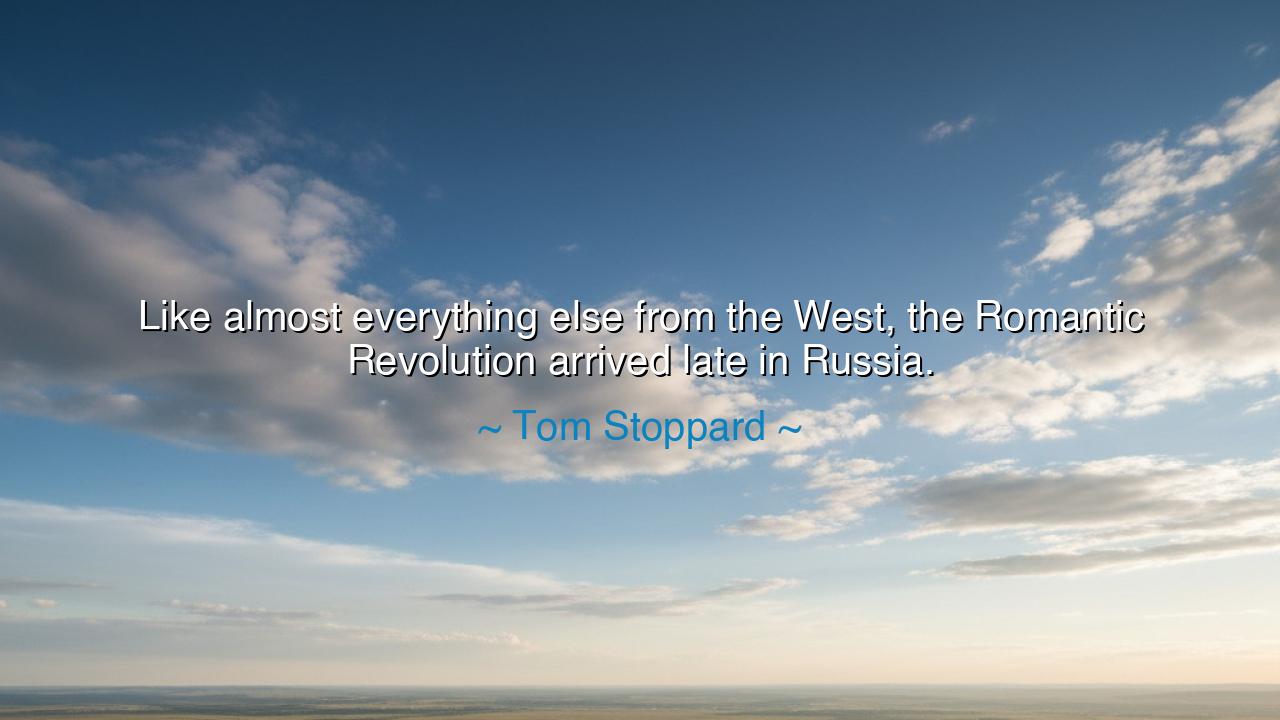
Like almost everything else from the West, the Romantic
Like almost everything else from the West, the Romantic Revolution arrived late in Russia.






The words of Tom Stoppard—“Like almost everything else from the West, the Romantic Revolution arrived late in Russia”—speak to the timeless rhythm of history, the ebb and flow of ideas across lands and cultures. Here he reminds us that Romanticism, that great upheaval of the spirit which swept through Europe in the late eighteenth and early nineteenth centuries, did not immediately take root in Russia’s soil. Instead, it came delayed, reshaped by the vastness of empire, by autocracy, and by the peculiar struggles of the Russian people. His statement is not mere history but a reflection on how nations, like individuals, awaken at different hours to the call of transformation.
The origin of the Romantic Revolution lies in the West—in the storm of poetry, music, and philosophy that arose in response to the Enlightenment and the Industrial Age. In England, Wordsworth and Coleridge sang of nature and the sublime. In Germany, Goethe, Schiller, and Novalis infused literature with passion and mysticism. In France, Victor Hugo and Lamartine turned their pens into instruments of both beauty and rebellion. This revolution of the heart prized imagination above reason, emotion above calculation, freedom above rigid form. Yet while Europe was aflame, Russia remained slower to ignite. Its society, bound by serfdom and ruled by iron autocracy, could not yet open itself fully to such ideals.
History gives us examples of this late flowering. The Russian poet Alexander Pushkin, often called the father of Russian literature, emerged in the early nineteenth century as the nation’s first great voice of Romanticism. By then, Byron had already blazed his stormy path through Europe, and the Romantic movement had reached maturity in the West. Yet Pushkin’s genius transformed the delayed arrival into something uniquely Russian: his poetry mingled European romantic ideals with the weight of Russian tradition, with folklore, and with the brooding vastness of his homeland. In him, Romanticism became not a copy, but a new creation.
So too with music. While Beethoven and Schubert carried Romantic music to greatness in Germany and Austria, Russia’s full flowering in this realm did not come until later, with composers like Tchaikovsky and the members of “The Five” in the mid-to-late nineteenth century. Their works, deeply emotional and richly nationalistic, carried the spirit of Romanticism but also transformed it into something Russian—grand, sweeping, and infused with the melancholy of a people whose history was marked by both suffering and resilience.
The lesson in Stoppard’s words is clear: though delayed, the arrival of ideas is no less profound. Just as seeds sprout at different times depending on the soil and the season, so too do nations and individuals receive revolutions of the spirit in their own hour. To come late is not to come lesser. For when Romanticism did arrive in Russia, it bore fruit of immense depth, creating works of art and literature that remain unmatched in their intensity and universality.
Practically, this teaches us patience with ourselves and with others. If you feel behind in your journey—late to love, late to wisdom, late to discovery—remember that lateness is not failure. When the seed finally bursts, it may yield something greater, more profound, than if it had come too soon. Russia’s late Romantic Revolution gave us Pushkin, Tchaikovsky, and Dostoevsky; in the same way, our own delayed awakenings may bring forth treasures that are uniquely ours.
Thus, Stoppard’s reflection is not only about Russia but about the rhythm of life itself. Revolutions of the heart and mind do not arrive on schedule; they arrive when the soul is ready. The West may come first, another land later—but each expression, in its time, adds to the great symphony of human history.
So let this truth be passed down: do not despair if inspiration comes late to you. For even delayed, it can transform your world, just as the Romantic Revolution, though late in Russia, gave birth to works that belong not only to a nation but to all of humanity.






AAdministratorAdministrator
Welcome, honored guests. Please leave a comment, we will respond soon